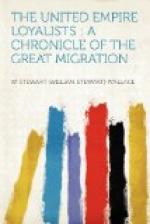The Loyalists were even denied civil rights in most of the states. In 1784 an act was passed in New York declaring that all who had held office under the British, or helped to fit out vessels of war, or who had served as privates or officers in the British Army, or who had left the state, were guilty of ‘misprision of treason,’ and were disqualified from both the franchise and public office. There was in fact hardly a state in 1785 where the Loyalist was allowed to vote. In New York Loyalist lawyers were not allowed to practise until April 1786, and then only on condition of taking an ’oath of abjuration and allegiance.’ In the same state, Loyalists were subjected to such invidious special taxation that in 1785 one of them confessed that ’those in New York whose estates have not been confiscated are so loaded with taxes and other grievances that there is nothing left but to sell out and move into the protection of the British government.’
It was clear that something would have to be done by the British government for the Loyalists’ relief. ’It is utterly impossible,’ wrote Sir Guy Carleton to Lord North, ’to leave exposed to the rage and violence of these people [the Americans] men of character whose only offence has been their attachment to the King’s service.’ Accordingly the British government made amends for its betrayal of the Loyalists by taking them under its wing. It arranged for the transportation of all those who wished to leave the revolted states; it offered them homes in the provinces of Nova Scotia and Quebec; it granted half-pay to the officers after their regiments were reduced; and it appointed a royal commission to provide compensation for the losses sustained.
CHAPTER VI
THE EXODUS TO NOVA SCOTIA
When the terms of peace became known, tens of thousands of the Loyalists shook the dust of their ungrateful country from their feet, never to return. Of these the more influential part, both during and after the war, sailed for England. The royal officials, the wealthy merchants, landowners, and professional men; the high military officers—these went to England to press their claims for compensation and preferment. The humbler element, for the most part, migrated to the remaining British colonies in North America. About two hundred families went to the West Indies, a few to Newfoundland, many to what were afterwards called Upper and Lower Canada, and a vast army to Nova Scotia, New Brunswick, and Prince Edward Island.
The advantages of Nova Scotia as a field for immigration had been known to the people of New England and New York before the Revolutionary War had broken out. Shortly after the Peace of 1763 parts of the Nova Scotian peninsula and the banks of the river St John had been sparsely settled by colonists from the south; and during the Revolutionary War considerable sympathy with the cause of the Continental Congress was shown by these colonists from New England. Nova Scotia, moreover, was contiguous to the New England colonies, and it was therefore not surprising that after the Revolution the Loyalists should have turned their eyes to Nova Scotia as a refuge for their families.




